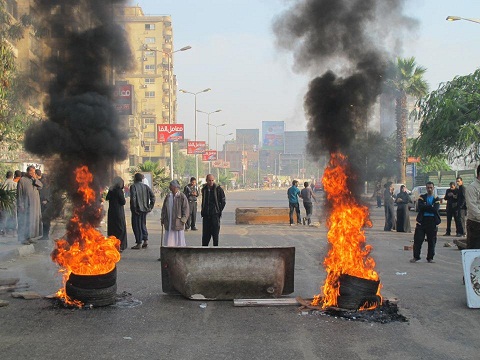TRIPOLI: Attempts to secure a ceasefire in Libya have failed and the humanitarian crisis is worsening, UN chief Ban Ki-moon told AFP, while Moamer Kadhafi’s embattled regime freed four foreign journalists.
The UN Secretary General said in an interview in New York that his special envoy to Libya, Abdul Illah Al-Khatib has been "working very hard" but he had no progress to report from efforts to sway Kadhafi to declare an immediate and verifiable ceasefire.
"In view of the deteriorating humanitarian situation, the crisis is getting worse," Ban warned.
He said he was very concerned about Misrata, which had been under siege from Qaddafi forces for more than two months and where hundreds have been killed. "The situation is getting very bad," he said.
Khatib travelled to Tripoli on Sunday where he held talks with regime officials on the need for a ceasefire and access to stricken Libyan cities, although he did not get to meet with Qaddafi himself.
The United Nations had Wednesday raised its aid funding appeal to $407.8 million from $310 million to help over two million people it said were affected by the Libyan conflict.
"The potential for a worsening of the humanitarian situation is very much present, with food, fuel and medical stocks running low, shortages of personnel in key sectors such as health, and no end in sight to the political situation which has divided the country," the UN said.
In Tripoli, four arrested journalists — two Americans, a Briton and a Spaniard — arrived at the Rixos Hotel late Wednesday after being freed by the authorities.
American James Foley of GlobalPost, an online news agency, and freelance writer Clare Morgana Gillis, as well as Spanish photographer Manu Brabo disappeared on April 4 while covering the conflict. They were freed along with Briton Nigel Chandler.
The Spanish foreign ministry said it "welcomes" the release of Brabo.
Britain’s foreign office confirmed Chandler’s release and said it was providing consular support.
Qaddafi is stubbornly refusing to call a halt to a conflict which erupted when he ordered his forces to put down pro-democracy protests launched on February 15 against his four-decade autocratic rule.
Thousands of people have died in violent clashes between regime opponents and Qaddafi loyalists, and some 750,000 have been forced to flee, according to data from the International Criminal Court and the United Nations.
Having lost vast swathes of the east of the country to rebels, and with almost daily bombardments by NATO jets acting under a UN mandate to enforce a no-fly zone and protect civilians, the regime has its back to the wall.
In recent days, Qaddafi’s position has become more precarious following a call by International Criminal Court chief prosecutor Luis Moreno-Ocampo for arrest warrants against the strongman, his second-oldest son Seif Al-Islam and his brother-in-law Abdullah Al-Senussi — for crimes against humanity.
Moreno-Ocampo went further on Wednesday and warned that the entire Libyan regime could face investigation and prosecution if it tried to cover up crimes committed against its people.
The ICC prosecutor’s office sent a letter to Libyan Foreign Minister Abdelati Laabidi.
"The office calls upon you and other Libyan authorities to refrain from being involved in such cover up. Failure to do so will result in investigation and prosecution," said the letter, shown to AFP.
Asked how crimes were covered up, Moreno-Ocampo said: "Even Mr Qaddafi himself said ‘where’s the bodies?’, because what they do is that their doctors are prohibited to register dead people in hospitals… the bodies are hidden."
Libya’s government spokesman Mussa Ibrahim has dismissed the ICC’s bid, saying the court has no jurisdiction over Tripoli while denying accusations the regime ordered the killing of civilians or hired mercenaries against them.
The rebels meanwhile have been growing in confidence and on Wednesday laid claim to being able to represent Libya at the June 8 meeting of oil cartel OPEC in Vienna, amid reports Qaddafi’s oil minister has defected.
"We want to attend, and will study the legal procedure," Mahmoud Shammam, media spokesman for the rebel National Transitional Council (NTC), told AFP in Dubai.
"We still do not know if OPEC will invite us," he said.
Libya is a key crude-exporting nation but its output has been slashed since the revolt erupted in mid-February.
Oil Minister Shukri Ghanem, a veteran of Qaddafi’s regime, at the weekend crossed from Libya into neighboring Tunisia, a Tunisian official said, although there has been no confirmation he has defected.
Ghanem, also chairman of Libya’s national oil company, had been due to attend the Vienna meeting of the Organisation of the Petroleum Exporting Countries but has made no comment since he left Libya and his whereabouts are unclear.
If confirmed, Ghanem would be among the most senior officials to abandon Qaddafi’s government since the revolt erupted.
